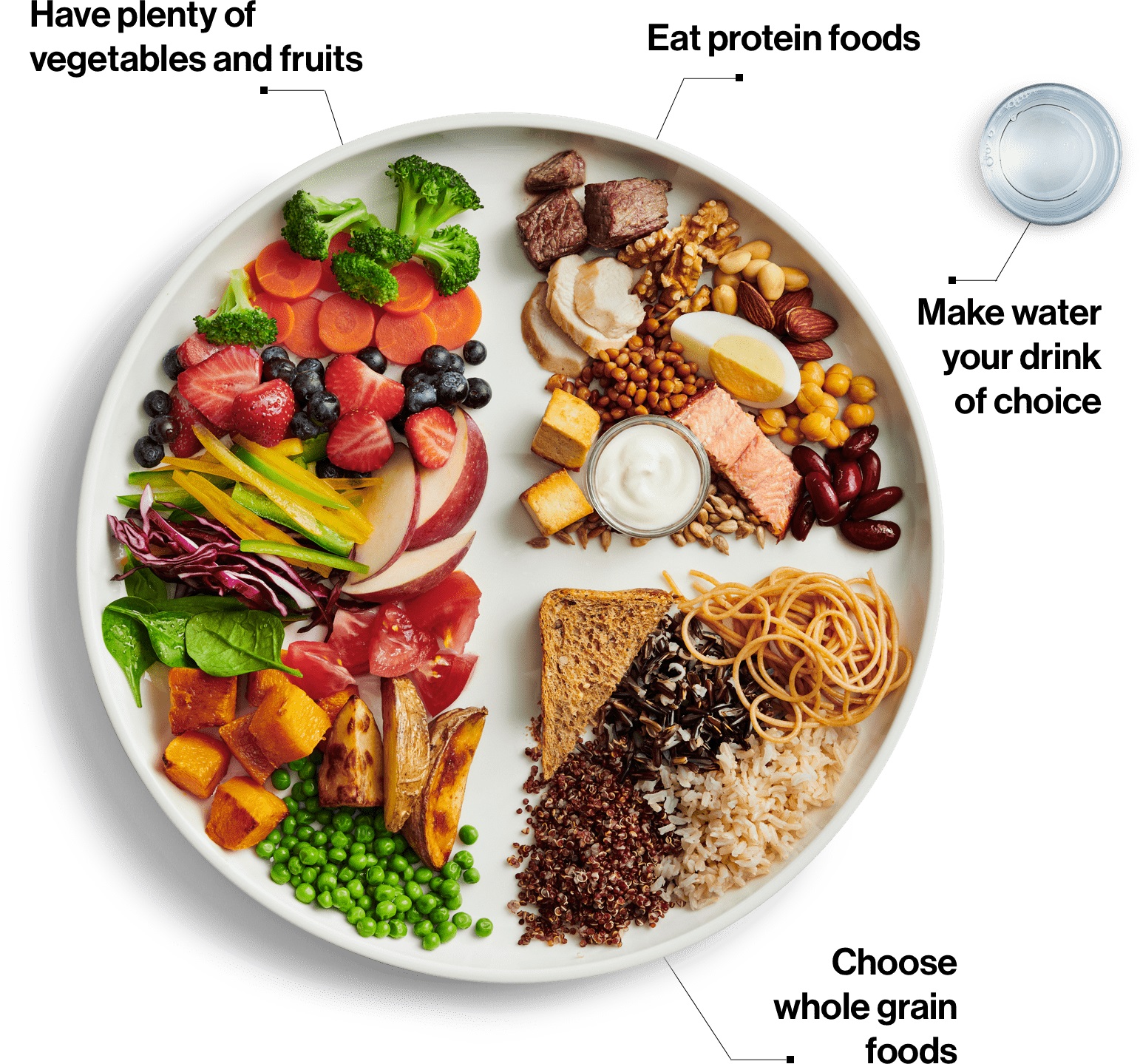Be Mindful of Your Eating Habits

Healthy eating is about more than just the foods you eat. It is being mindful of your eating habits, taking time to eat and noticing when you are hungry and when you are full.
Benefits of being mindful of your eating habits
Being mindful of your eating habits means being aware of:
- how you eat
- why you eat
- what you eat
- when you eat
- where you eat
- how much you eat
Being mindful can help you:
- make healthier choices more often
- make positive changes to routine eating behaviours
- be more conscious of the food you eat and your eating habits
- create a sense of awareness around your every day eating decisions
- reconnect to the eating experience by creating an awareness of your:
- feelings
- thoughts
- emotions
- behaviours
How to be mindful of your eating habits
Use these ideas to help you be mindful of your eating habits.
Create a healthy eating environment
Your eating environment changes depending on where you live, learn, work and play. Focus your attention on eating and your eating environment.
Regardless of where you are, try to make changes to your surroundings so that the healthy choice is the easy choice.
Use your senses
Being mindful of the foods you eat encourages you to pay attention to the aromas, textures, flavours and taste of food. Pay attention to your likes and dislikes using these senses. This may help connect you to your eating experience and be more conscious of the food you are eating.
Consider your eating habits
Think about the last meal or snack that you had. Can you describe:
- how you ate?
- did you eat slowly?
- were you distracted?
- did you eat with others?
- why you ate?
- were you hungry?
- was it offered to you?
- what you ate?
- what did you have to eat and drink?
- when you ate?
- what time was it?
- how long had it been since the last time you ate?
- where you ate?
- were you in a space meant for eating?
- how much you ate?
- how much food and drink did you have?
Being able to recall and describe answers to these questions means you were likely being mindful of your eating habits.
Cook More Often

Cooking more often can help you develop healthy eating habits. You can cook more often by planning what you eat and involving others in planning and preparing meals.
Benefits of cooking more often
Cooking and preparing food can support healthy eating habits. Cooking allows you to:
- learn new skills
- rely less on highly processed foods
- control the amount of sauces and seasonings
- make foods that you and your family like and will eat
- save money by avoiding extra money spent on meals eaten out
- choose healthy ingredients like:
- fruits
- vegetables
- whole grain foods
- protein foods
- choose protein foods that come from plants more often
How to cook more often
You can make cooking faster and easier. Use these ideas to help make cooking part of your routine.
Cook once and eat twice
Cook enough for another meal. This doesn’t mean that you need to eat the same meal twice.
Get creative with leftovers to make a whole new meal:
- Cook double the rice for your stir-fry and use the extras for rice pilaf.
- Cook twice the chicken or ground turkey you need and keep extras to make chicken salad, enchiladas, chili or spaghetti sauce.
- Keep flavours simple so foods can be used for many meals. Chili one night turns into tacos the next and a topping for spaghetti another night.
When preparing meals, chop or cook extra vegetables and fruits so you have some for snacks and meals the next day.
Become a big batch cook
Batch cooking simply means making meals and snacks in bigger batches and freezing them in meal-size portions for convenient weekday meals. This can save you time and money.
These healthy homemade options are ideal for batch cooking:
- chili
- soups
- stews
- casseroles
- pasta dishes
- spaghetti sauce
Use time-saving tools
Make home cooking easier by using time-saving tools. Try a:
- mini-chopper to quickly dice up garlic and onions
- hand blender to make quick and easy soups and sauces
- slow cooker to cook food while you are busy during the day
- pressure cooker to reduce cooking times and make meals in a hurry
Keep healthy options on hand
The best way to cook quick, healthy meals and snacks is to keep your kitchen stocked with healthy ingredients like:
- soup broth to add flavour
- bagged leafy greens to make an easy salad
- your favourite herbs and spices to add flavour
- pre-cut vegetables to use for snacks and stir-fries
- canned tuna or salmon to add to a salad or sandwich
- frozen or canned vegetables to make a quick side dish
- canned chickpeas and lentils to toss into soups, salads or main dishes
Healthy cooking methods
Explore different ways to cook food. Try those that require little to no added fat. This includes:
- baking
- grilling
- broiling
- roasting
- steaming
- stir-frying and sautéing
Make a healthy choice
What you eat on a regular basis matters for your health.
- Choose foods that have little to no added sodium, sugars or saturated fat.
- Compare the nutrition facts table on foods to choose products that are lower in sodium, sugars or saturated fat.
Enjoy Your Food

Enjoying your food is part of healthy eating. Enjoy the taste of your food and the many food-related activities that go along with eating.
Benefits of enjoying your food
The benefits of enjoying your food include:
- tasting the flavours
- being open to trying new foods
- developing a healthy attitude about food
Knowing that you are making healthy food choices can increase your enjoyment of food.
Enjoying your food includes:
- socializing at mealtime
- enjoying shopping for food
- preparing and cooking food
- growing or harvesting your own food
- getting to know the people that grow or produce your food
- involving others in meal planning, preparation and clean up
How to enjoy your food
There are many ways to enjoy your food and make healthy choices. Try these ideas to add enjoyment to healthy eating.
Enjoy your food by making choices that reflect:
- taste
- enjoying your food should be about choosing a variety of healthy foods and flavours that you like
- culture
- culture and food traditions can be a great way to add to the enjoyment of your food
- budget
- there are many ways to enjoy your food while eating on a budget
- lifestyle
- there is no one right way to enjoy your food; you can enjoy your food no matter what your lifestyle
Try new foods
Try a variety of healthy foods to help you find new foods to enjoy. Trying new foods can appeal to a sense of wonder and even adventure.
Create a positive eating environment
Part of enjoying your food can be enjoying the atmosphere around it. The setting around you can contribute to making meal times more satisfying. Creating a positive eating environment can include:
- eating with others
- making your eating area attractive
- turning on some of your favourite music in the background
Eat Meals With Others

Eating meals with others is a part of healthy eating.
Benefits of eating with others
Enjoying healthy foods with family, friends, neighbours or co-workers is a great way to connect and add enjoyment to your life. It can provide many benefits and contribute to a healthy lifestyle.
By eating with others you can:
- enjoy quality time together
- share food traditions across generations and cultures
- explore new healthy foods that you might not normally try
Food is often a main part of celebrations and special events. However, eating with others doesn’t have to be saved for special events.
How to eat with others more often
Making time to enjoy meals with others doesn’t just happen. With busy schedules at work, school and home, making time to enjoy your meals with others can often get pushed aside.
The key to making it happen often starts with a plan. You could:
- plan a breakfast date with friends
- participate in community celebrations and feasts
- start a regular community meal with your neighbours
- have lunch with a co-worker at work or friend at school
- ask your local community centre about groups you could join
- plan a weekly dinner with extended family members or friends
- eat dinner with:
- roommates
- a neighbour
- family members
- start a dinner party among your friends where everyone takes a turn hosting
When you eat with others, it’s important to remember to:
- Take your time. Don’t feel the need to rush. Enjoy your food and the social aspect of being together.
- Put away distractions like the TV or electronics. This can help you be mindful of your food choices.
- Use it as a chance to connect. Talk to those around you and share what is going on in everyone’s life.
More information for families
Mealtime is a great opportunity to bring the family together. Eating together as a family benefits everyone. It can help the whole family:
- share and connect with one another
- take time to enjoy and relax over a meal
- talk about events that occurred during their day
Kids especially can benefit from regular family meals as they are starting to develop their eating habits and behaviours. Eating together as a family can help kids:
- explore new healthy foods
- establish healthy eating routines
- improve their overall eating pattern
- explore cultural and traditional foods
As a parent or caregiver, you can be a positive role model. By practising healthy eating habits, you can help create a positive relationship with food and the foods kids will eat.
More information for seniors
Seniors often tend to eat alone. This can result in a sense of isolation and feelings of loneliness, especially at mealtimes.
These feelings, along with other changes you may experience as you age, can result in a loss of appetite. Eating less can impact your intake of important nutrients.
By eating with others more often, you can:
- make mealtime more sociable
- spend more time eating and enjoying a meal
- increase the amount of food you eat, which can help you get more of the important nutrients you need for health
Having a meal with friends or neighbours or participating in a community meal program are great ways to eat with others.


